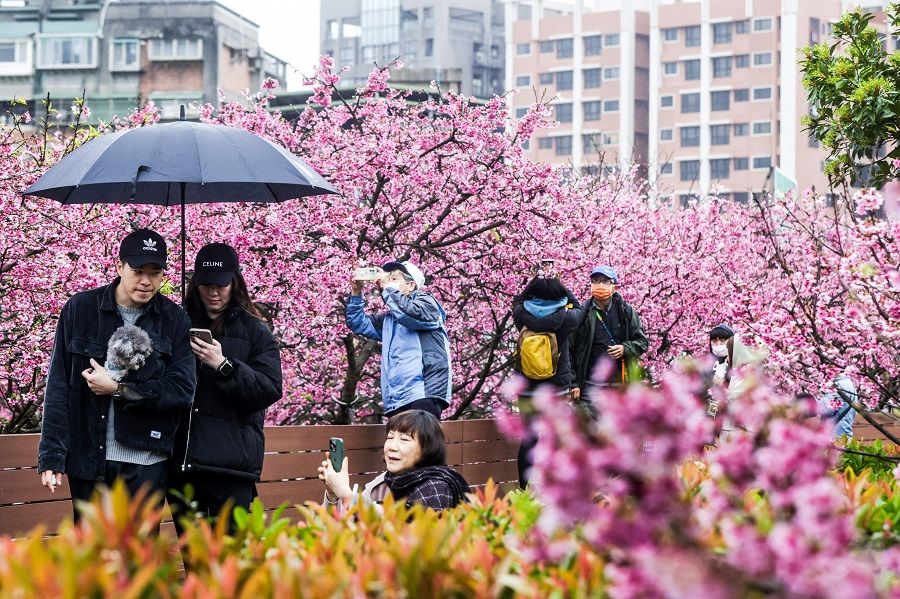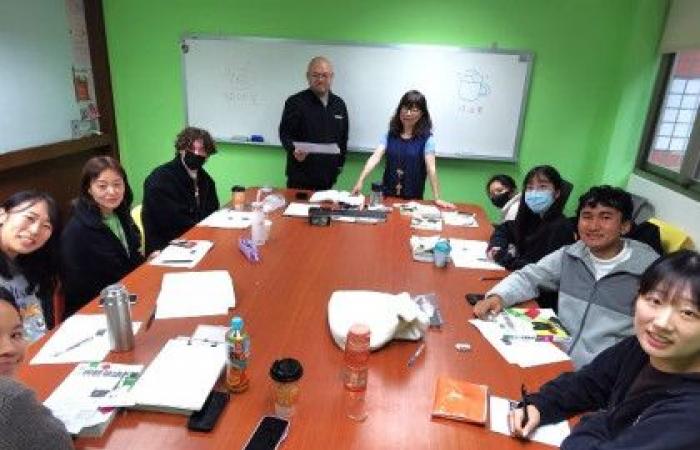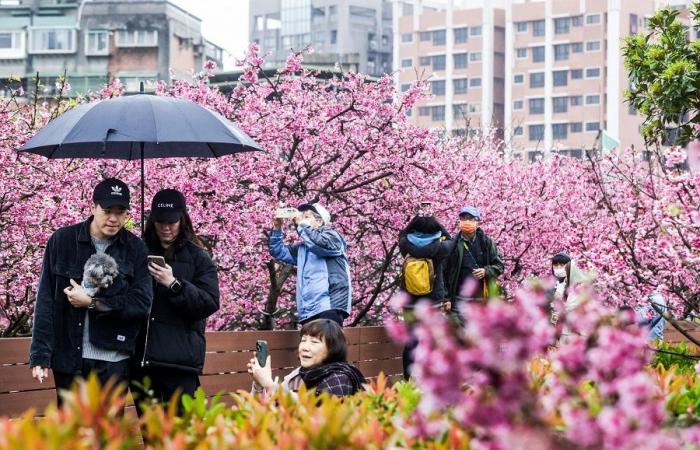In 2023, 36,350 foreigners came to Taiwan to learn Mandarin, an increase of over 30% for the second consecutive year and surpassing the pre-pandemic peak.
Amid intensifying China-US strategic competition and a post-pandemic tourism rebound, more foreigners are heading to Taiwan to learn Mandarin.
Pre-pandemic peak topping
On 4 March, Taiwan Deputy Minister of Education Liu Mon-chi revealed at a high-level dialogue held in the US under the Taiwan-US Education Initiative that a record 3,080 US students will come to Taiwan to study Mandarin this year. Taiwan’s Ministry of Education has also selected 147 Mandarin-language teachers and teaching assistants to teach at 56 universities in the US.
Based on figures obtained by Lianhe Zaobao from Taiwan’s Ministry of Education, a total of 36,350 foreigners came to Taiwan last year to study Mandarin. This is an increase of 30.7% over the 27,808 foreigners in 2022, which is in turn an increase of 38% over the 20,145 foreigners in 2021. Compared with the pre-pandemic peak of 32,457 foreigners in 2019, the 2023 figure is an increase of 12%.
Meanwhile, the number of foreigners heading to mainland China to learn Mandarin in recent years is unclear. The Paper reported that the mainland had about 443,000 foreign students in 2016, among which 38.2% or 169,000 were there to learn Mandarin.
Since 2017, the number of foreigners heading to the mainland to learn Mandarin cannot be found online. However, an education-related WeChat official account quoted a report on the teaching quality of undergraduate programs of regular higher education institutions as saying that 105,200 international students were enrolled in undergraduate programs at 533 higher education institutions in mainland China in 2020. Among the top ten most popular undergraduate majors among international students, “Teaching Chinese to Speakers of Other Languages” and “Chinese Language and Literature” ranked seventh and eighth place respectively.
… Taiwan has been leveraging its “warm power” to attract foreign students to Taiwan to learn Mandarin over the past years… “the warm and gentle environment” makes for unconstrained Mandarin learning and naturally gaining bilingualism. —Professor Yang Hao, Graduate Institute of East Asian Studies, NCCU
UK student: 90% of peers studying Mandarin in Taiwan
To deal with the demand for learning Mandarin among foreigners, several universities in Taiwan have set up Chinese language centers to serve foreign students. Taking the Chinese Language Center at National Chengchi University (NCCU) as an example, it attracted 1,041 students from 69 countries last year, including 131 Japanese, 108 South Koreans, 99 Thais and 95 Americans.
I visited the center on 6 March and found that its classes are conducted in smaller sizes which is conducive to a higher level of engagement between teachers and students. In one class, there were only eight students, and they came from five countries, including the UK, South Korea, Japan, Thailand and Vietnam.
Ben, a 22-year-old student from Leeds, England, said that he had studied Chinese for a year at a university in the UK, and among his classmates who continued to study Chinese abroad, 90% of them have come to Taiwan like him, while only 10% headed to the mainland. He said that he likes the learning environment in Taiwan but has also thought about visiting the mainland in the future.
Li Weizhou, 23, a recent Chinese Studies graduate from a Thai university, said that he is very interested in the beauty of pictographs in traditional Chinese characters and hopes to use more Chinese in his daily life. He is grateful for the six-month scholarship from the Taiwan government and wishes to stay in Taiwan and work in the Chinese language field.
Sharon Tsang, a teacher at the Chinese Language Center at NCCU who has been teaching Chinese for over 30 years, said that foreign parents are comfortable with their children learning Mandarin in Taiwan. Teachers and students are able to speak freely in the classroom and foreign students will take the initiative in class and quickly gain fluency in Mandarin. “I love teaching such students,” she added.
Taiwan’s ‘warm power’
Yang Hao, a professor at NCCU’s Graduate Institute of East Asian Studies and director of the Chinese Language Center, told Lianhe Zaobao that Taiwan has been leveraging its “warm power” to attract foreign students to Taiwan to learn Mandarin over the past years, adding that “the warm and gentle environment” makes for unconstrained Mandarin learning and naturally gaining bilingualism.
Yang stated that in the past decade or so, there has been a global wave of Mandarin learning fever, which has led to a rise in global interest in the Mandarin language market, Chinese culture and business interaction with Chinese societies. This has greatly increased the demand for learning the language.
He stated that with China-US competition intensifying in recent years, Mandarin teaching is now seen as a strategic resource. Take for example the mainland’s Confucius Institutes (CIs) — with its mission of promoting language and culture — in 2017, the US’s National Endowment for Democracy cited these institutes as a negative example of “sharp power” that Beijing uses to expand its authoritarian influence. In 2020, the US State Department designated these institutes as foreign missions, and the US Defense Department barred funding for US institutions that host CIs. The number of ICs in the US has drastically dropped from its peak of 110 to 5.

In July 2023, the Language Flagship program spearheaded by the US Defense Department set up a Taiwan center at NCCU, partnering with the Chinese Language Center and conducting lessons in their classrooms. This program is an initiative by the US government to develop talents proficient in languages such as Mandarin and Russian.
After obtaining accreditation from any of the 13 US colleges that offer the program, students would head overseas in their final year for immersive studies. Past Chinese Flagship programs sent students to Shanghai, but it has been switched to Taiwan since 2019, with the first Taiwan center established at National Taiwan University.
… it could strengthen international support for Taiwan in the long run, but it may also widen the rift between the world and mainland China, adding to the mainland’s unease in dealing with the Taiwan issue. —Professor Ding Shuh-fan, Chair, Chinese Council of Advanced Policy Studies
Carrot and stick strategy
Yang stated that against the backdrop of worsening relations between Washington and Beijing, Taiwan cannot be overly optimistic and must capitalize on its strengths amid the crisis, such as its free and transparent education and advanced semiconductor technology, and look to develop more Mandarin teaching methods enhanced by cutting-edge artificial intelligence (AI).
He raised examples of how there are already unique teaching tools, such as using AI to rate a person singing Mandarin songs at a karaoke or to generate a comic from written diary entries, which would increase interest in language learning.
Professor Ding Shuh-fan, chair of Taipei-based think tank Chinese Council of Advanced Policy Studies, told Lianhe Zaobao that more foreigners coming to Taiwan to learn Mandarin would certainly strengthen the international community’s goodwill and sympathy for Taiwan, as well as the call for increased government exchanges.
But in reality, sympathy and verbal support do not necessarily translate to actual diplomatic recognition. In the short term, it would be more practical to think that they could be transformed into concrete economic, trade or technological support for Taiwan.

Ding frankly said that with the number of foreigners coming to Taiwan to learn Mandarin rising each year, it could strengthen international support for Taiwan in the long run, but it may also widen the rift between the world and mainland China, adding to the mainland’s unease in dealing with the Taiwan issue.
If Taiwan wants to improve its security, it still needs to adopt effective deterrence with a two-pronged approach of the carrot and the stick, which includes strengthening its military capabilities, effectively responding to the issue of freezing the Taiwan independence platform, and strengthening mutual strategic trust with both the US and Beijing.
This article was first published in Lianhe Zaobao as “赴台学华语外籍学生创新高”.
Related: Mandarin learning in Brunei’s Chinese schools: Practical considerations | What language should one speak to be Singaporean?
Tags: Taiwan gains ground destination learn Mandarin Society News
--








